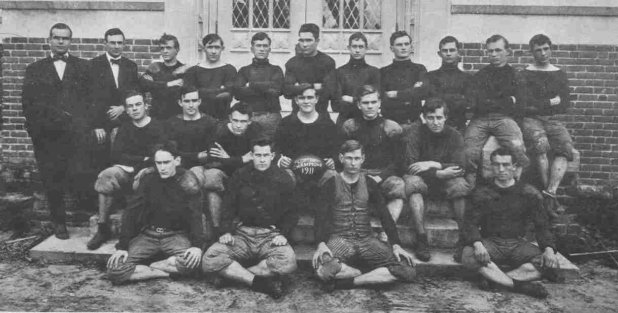

The 1911 Florida Alligators. Captain Neal "Bo Gator" Storter is pictured in the center with the football.
The 1911 football team was the first University of Florida varsity team called the Alligators. (The diminutive form, Gators, was also used that year, but it did not become the recognized nickname until after World War I.) Fittingly, every player on the 1911 team was a Floridian, and it is the only squad in Gator football history to finish a season undefeated. The team started the season, without a name, by beating The Citadel at home on October 7. The victory was excellent preparation for the next two games: a difficult road trip to South Carolina that pitted Florida against the larger squads of Clemson and USC.
Precisely when and how the team was named is unclear, but several accounts identify the South Carolina excursion as the beginning of the Florida Gators. "It was on the South Carolina trip that the Florida team was dubbed the ‘Alligators,’ and the battle that took place . . .between the Clemson Tigers and the Florida Alligators is one long to be remembered!" declared the Florida Pennant, predecessor to the Alligator, in its December football issue. The earliest printed references to the team as the Alligators occurred on October 20th in both the South Carolina and Florida newspapers. "Gamecocks clash with Alligators" was the headline in The State, South Carolina’s leading newspaper. In his daily sports column for the Florida Times-Union, Laurence "Kiddo" Woltz reported that the team had passed through Jacksonville on its way to Columbia. "This is probably the ‘biggest trip’ ever taken by an eleven from any of the Florida colleges and thousands of people throughout the state will await the result of the games with the greatest of interest. May the ‘Gators’ win ‘em both."
The game at Columbia on October 21st resulted in a tie. Halfback Earle "Dummy" Taylor scored for Florida in the first quarter and South Carolina matched Florida in the second quarter. The remainder of the game was a defensive battle. For the first time in Florida history, the Associated Press gave the results of a Florida football game and the new nickname was spread across the nation. "The Florida team’s brilliant showing is creating considerable talk in local college circles and it is figured that the ‘Alligators’ must be reckoned with in future year," the AP declared.
Playing on "foreign soil," Florida’s press claimed a "virtual victory." Next, the Florida team traveled to Clemson and the "dope" had the Gators as fifteen point underdogs. Clemson scored a touchdown early in the game, missed the extra point, and failed to score on subsequent drives. With eight minutes left in the game, Taylor made a spectacular 35 yard run into the Tigers’ end zone and kicked the point-after. The score remained 6-5, Florida victorious. The rest of the season was anti-climactic. After beating the South Carolina champions, Florida won the state championship with victories over Stetson and Columbia College. The last game of the season was a 21 to 0 pasting of the College of Charleston on Thanksgiving Day in Jacksonville.
Several explanations for the nickname have been offered over the years. In 1948, the son of a Gainesville merchant whose soda fountain was a popular student hangout in the early 1900s claimed that alligators appeared on pennants sold at his father's store as early as 1908 and, eventually, the name took hold. This story became the unofficial explanation for the nickname despite two claims that the team was named after the captain and center of the 1911 football squad, Neal "Bo Gator" Storter. Storter, however, denied the claim and attributed the nickname to a newspaper article describing a Florida road trip as an invasion of alligators.
Historical evidence supports the argument that Storter was the source of the nickname. Storter was the leader, the Chief Bo Gator to be precise, of the Bo Gator Club. More fictional than real, the exploits of the Bo Gators are chronicled in several student publications in the years 1907-1910. More than any other student group in its day, the Bo Gators typified the early Florida students. It would be logical to suggest that the origins of the nickname lie in this fugitive student organization whose leader was, by chance, the captain of the football team.